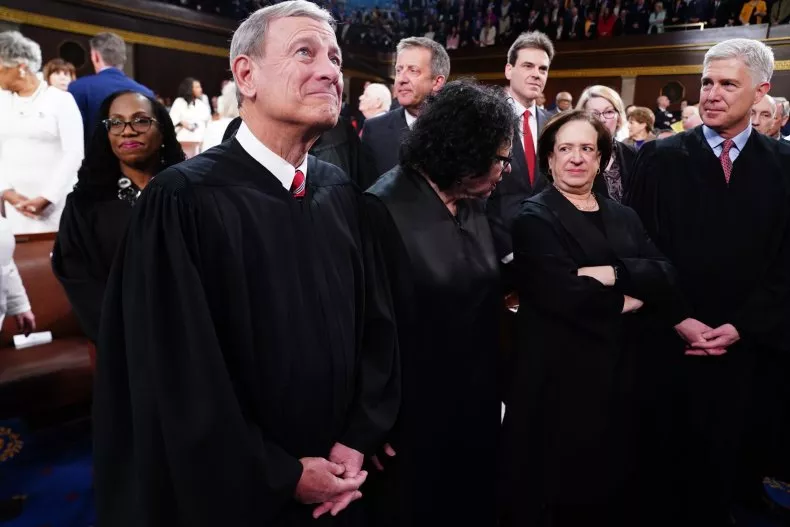Roberts, Gorsuch Join Liberal Justices in Supreme Court Immigration Ruling

By Jenna Sundel and Gabe Whisnant
Reporter (Live News)
Trust Project Icon
Newsweek Is A Trust Project Member
FOLLOW
news article
Based on facts, either observed and verified firsthand by the reporter, or reported and verified from knowledgeable sources.
35
Translate
In a narrow 5-4 decision on Tuesday, the Supreme Court ruled that immigrants who agree to leave the U.S. voluntarily are entitled to deadline flexibility when the deadline falls on a weekend or holiday.
Why It Matters
The ruling came in the case of Hugo Abisai Monsalvo Velázquez, a Mexican national who entered the country illegally as a teenager and lived in Colorado for nearly 20 years before receiving a removal order in 2021. The case was argued in November 2024, shortly after President Donald Trump's re-election and amid a renewed focus on immigration enforcement.
What To Know
Writing for the majority, conservative Justice Neil Gorsuch stated that standard legal principles apply, meaning a Saturday deadline to depart the country should extend to the next business day. He was joined by Chief Justice John Roberts, also a conservative, and the court's three liberal justices.
Justices at Trump speech
U.S. Supreme Court Chief Justice John Roberts (L) and Associate Justices (L-R) Sonia Sotomayor, Elena Kagan and Neil Gorsuch stand on the House floor ahead of the annual State of the Union address by U.S.... More AFP/Getty Images
"Here, as elsewhere, the term 'days' operates to extend a deadline that falls on a weekend or legal holiday to the next business day," Gorsuch wrote in the opinion.
The remaining four conservative justices dissented, arguing that the Court should have left the matter to a lower court to decide whether federal courts have jurisdiction in this case.
Justice Samuel Alito also wrote in a dissent joined by Justice Brett Kavanaugh that the there is "no justification" in finding that Monsalvo Velázquez was entitled to a two-day extension.
What People Are Saying
Gorsuch, in the Supreme Court's majority opinion: "Who is right on this question
of statutory interpretation matters greatly to people like Mr. Monsalvo. Not only does it affect the time one may have to reopen immigration proceedings. As we have seen, it also affects an individual's exposure to detention, removal, and
fines, and carries with it serious ramifications for his ability to seek lawful status for years into the future."
Read more Supreme Court
Donald Trump Rails Against Holding Trials for Migrants He Wants to Deport
Trump Reacts to Supreme Court Deportation Rulings: 'Ridiculous Situation'
Supreme Court Passes on Gun Rights Cases After Landmark Rulings
Republican John Kennedy Calls Out Trump Admin 'Screw Up' With Abrego Garcia
Alito, in a dissenting opinion: "The Court is sympathetic to petitioner's plight, but the relevant statutory provision sets a deadline, and no matter how such a deadline is calculated, there will always be those who happen to miss it by a day or so."
What Happens Next
The Court's ruling reversed a decision made by the Tenth Circuit Court of Appeals. The case was remanded for further proceedings consistent with the Court's opinion.
Reporting by the Associated Press contributed to this story.
Do you have a story that Newsweek should be covering? Do you ha
Welcome to Billionaire Club Co LLC, your gateway to a brand-new social media experience! Sign up today and dive into over 10,000 fresh daily articles and videos curated just for your enjoyment. Enjoy the ad free experience, unlimited content interactions, and get that coveted blue check verification—all for just $1 a month!
Account Frozen
Your account is frozen. You can still view content but cannot interact with it.
Please go to your settings to update your account status.
Open Profile Settings